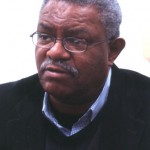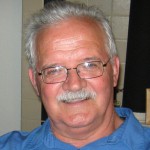James E. Jackson, Jr., a giant in the struggle for African American equality, world peace and socialism, passed away Sept. 1, just short of his 93rd birthday. He was one of the truly heroic figures of the African American freedom movement, the progressive movement generally, and the Communist Party USA. He was an activist, mass leader, theoretician, tactician, teacher, writer and humanist, beginning at age 16. He was devoted to Esther Cooper Jackson, his wife of 66 years, a major leader in her own right, and to his daughters Harriet and Kathryn and their families, as well as to his many friends and comrades.
Southern roots
Jim Jackson grew up in Richmond, Va. , son of a pharmacist and community leader in this former capital of the Confederacy. In 1937, Jackson left Howard University to join other members of the Young Communist League in founding and building the Southern Negro Youth Congress (SNYC). Joining him in this effort were Esther Cooper (soon to become Jims wife), Ed and Augusta Strong, Louis and Dorothy Burnham and Grace Bassett. Some of SNYCs materials such as its petition for a new South and the Behold the Land speech of leader and scholar Dr. W.E.B. Du Bois at SNYCs Columbia, S.C. , congress in 1946 reached as many as 100,000 young people.
In 1941, Mildred McAdory, a domestic worker and SNYC activist, refused to give up her seat on a bus to a white person in Birmingham, Ala., and was arrested. SNYC led a big struggle on her behalf. Years later, she became a member of the CPUSAs National Committee from Harlem. Rosa Parks, the heroine of the Montgomery Bus Boycott and the civil rights movement, later credited the role of both the NAACP and SNYC.
Devoted to African American freedom, union organizing
Jackson devoted most of his attention in those days to union organizing and voter registration in the South. His life was in constant danger. Working closely with Black longshore workers in organizing the New Orleans port, Jackson and a leader of the longshore workers were arrested. Protests forced the police to release them. But the police schemed to put them into the hands of killers. Fortunately, the two managed to elude their would-be executioners.
Jackson was joined by Chris Alston, another YCLer who later played an important role in building the United Auto Workers union in Detroit, in organizing 5,000 tobacco workers, mainly African American women in Richmond . This took a bitter strike to accomplish.
World War II and Cold War repression
Jackson s activity with SNYC was interrupted by service in the Army in the Burma-China-India theater during World War II, the war to defeat fascism. After the war, he resumed work with SNYC in the South. When it was decided SNYC could not continue in the face of Cold War repression, Jackson became Communist Party secretary for Louisiana in 1947.
During the height of McCarythism, with the National Board of the Communist Party under indictment, Jackson went underground for some five years, separated from his wife and small children. In 1956, Jackson was among Communist Party leaders convicted under the infamous Smith Act for conspiring to teach sometime in the future the overthrow of the government by force and violence. Among Jacksons character witnesses were Ralph Bunche, then UN ambassador, who had been at Howard University with Jim, and who provided a sworn written statement. Another character witness was W.E.B. Du Bois. Jackson was convicted, but a Supreme Court decision in another case prevented Jackson from being imprisoned.
In the second half of the 1950s he became Southern regional secretary of the party.
In the early 1960s, after he moved to New York to assume the post of editor-in-chief of the partys newspaper The Worker, he continued to make trips to the South during the height of the civil rights revolution.
Detroit years
In the late 1940s, Jim and Esther Jackson moved to Detroit , where Jim headed the educational work of the Communist Party among hundreds of Ford autoworkers who were also members of the party. (Years later, Jackson used his skills in teaching the science of Marxism to train a new generation of CPUSA leaders).
In Detroit, the Jacksons shared a house with Coleman Young who was to become Detroit s longtime mayor and a lifelong friend. Esther played a major role in the Civil Rights Congress in Michigan . Among her many other important contributions was as the driving force behind Freedomways magazine for 25 years. Freedomways served as an unofficial voice of the civil rights revolution.
Well-known and respected
During all those years, virtually every major leader of the African American people in the South as well as the North knew and deeply respected Jackson . Many had worked with him in the struggle. Among them were 1960s civil rights movement leaders who knew him from SNYC days, leaders of the labor movement and scholars. Jackson worked for a time with Ralph Bunche doing research for Gunnar Myrdals An American Dilemma.
Jackson was particularly close to Paul Robeson and Du Bois. When Du Bois was preparing to leave the United States at the invitation of Kwame Nkrumah, to work on the Encyclopedia of Africa in Ghana , he asked Jim to meet with him and discuss questions of Marxist theory and policy. Du Bois joined the CPUSA in 1962.
Theoretical contributions
In the mid-1950s, the Communist Party saw the need to update its theoretical position on a number of issues including intermediary strategic goals on the way to socialism and the struggle for African American freedom. It turned to Jackson to lead these efforts. On African American freedom, Jackson argued that the concept of self-determination for a Negro nation in the Black belt of the South should be replaced with the current concepts of special compensatory measures to achieve full equality throughout the country. He contended that the struggle for African American equality is central to the struggle for democracy and progress in the country as a whole. His position prevailed.
Internationalist through and through
While Jackson served as CPUSA international affairs secretary, during the height of the bombing of Hanoi, he traveled to North Vietnam and interviewed Ho Chi Minh. One of his prized possessions was a photograph of himself with the great Vietnamese leader. Jackson and then CPUSA National Chairman Henry Winston also played an important role in assisting the South African Communist Party and the African National Congress in the struggle against apartheid, helping build solidarity activities in the U.S.
Lifelong fighter for socialism
In the early 1990s, during the collapse of the Soviet Union and the ensuing upheaval in the Communist movement, Jackson withdrew from the party. But he and Esther continued with lectures, interviews and other activities to help educate younger people on the history of the freedom struggle, and other struggles for progress and socialism. Many students and historians came to them for help. Many contemporary books dealing with the struggles in the South pay tribute to the pioneer work of Jim and Esther Jackson, most notably the two-volume Pulitzer Prize winning biography of Du Bois by David Levering Lewis.
Jackson was a prolific writer of articles, pamphlets and books throughout his life. These ranged from reportage to editorials to theoretical works. The books include Revolutionary Tracings (1974) and The Bold, Bad 60s (1992), both from International Publishers.
In his final years, Jackson attended several meetings of the Communist Partys National Committee. At one, his contributions to the struggle for equality, peace, democracy and socialism were recognized with an honorary plaque. In response, Jackson expressed his support for the goals of the party and for its work and told of his confidence in the future of the party and the cause of socialism, the cause for which he had devoted his life.
James Jackson, presente!
For 30 years we experienced the great contribution of comrade Jim Jackson up close. He was truly a gifted teacher and a brilliant thinker. For hundreds of us younger party members, he shed the light of scientific socialism on the most complex problems of our day, and we in turn brought these insights to thousands of our generation who were fighting for an end to racism, war and exploitation. He touched us with his charismatic style and keen sense of humor. We were all made stronger and more effective as a result. We continue the struggle today in no small part due to his great leadership. He will not be forgotten.
As the Latin American left says, James E. Jackson, presente! Jackson joins the pantheon of outstanding progressive and communist leaders of the U.S. and the world!
Jarvis Tyner is Communist Party USA executive vice chair and Sam Webb is CPUSA national chair.



 Join Now
Join Now